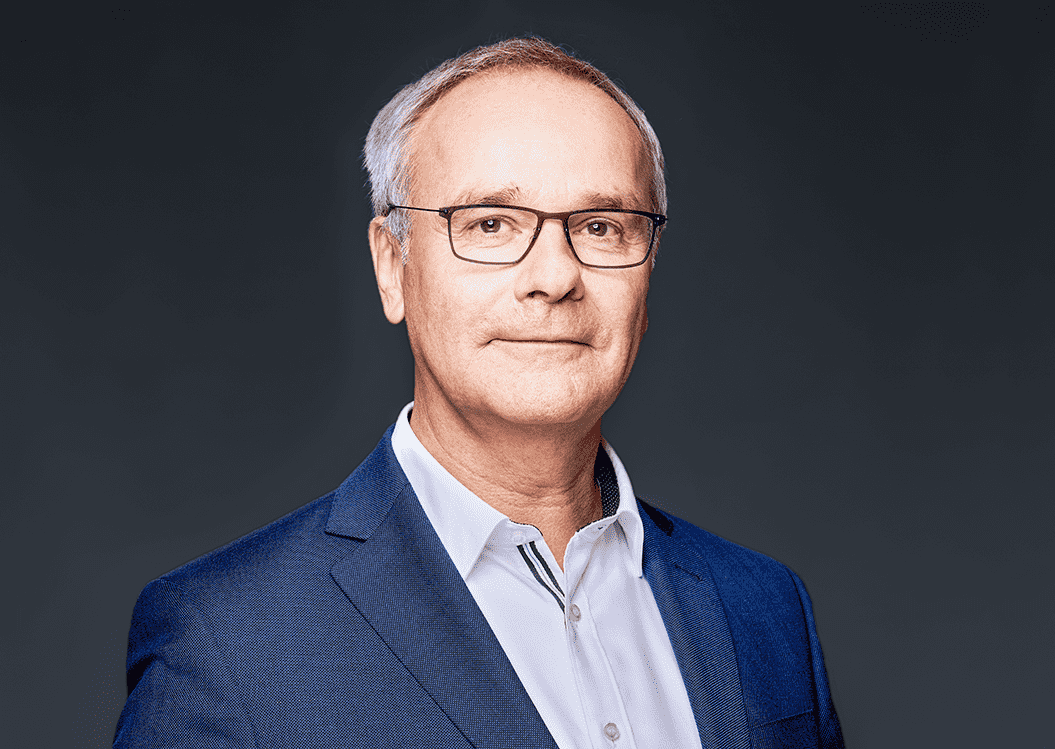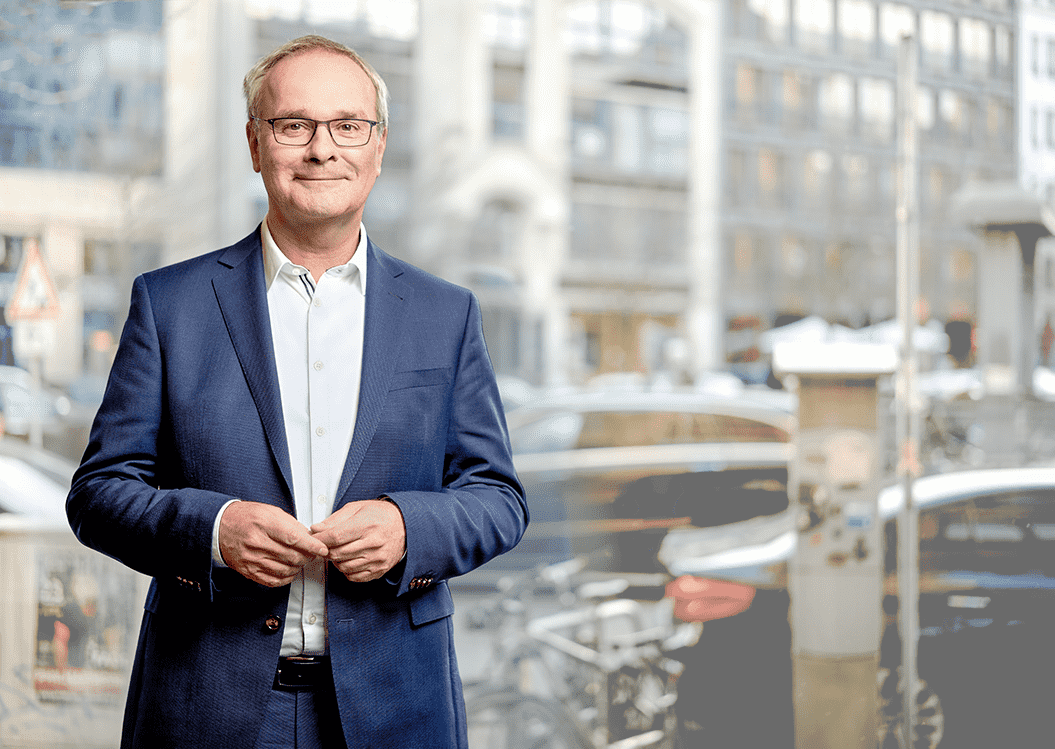The success of the sustainable transformation of the economy and society is decided locally, in towns and cities. At the same time, municipalities are under enormous pressure from all sides – be it from the aftermath of Corona, the energy crisis or online retailing.
We need a new understanding of urban life and new concepts – also with regard to a regenerative local energy supply. Helmut Dedy explains in an interview how this can be implemented as a collaborative effort, also with the help of the Savings Banks.
Mr Dedy, energy crisis, Ukraine war, inflation, transportation transformation as well as the sustainable transformation of the economy and society: how are towns and cities facing the future in the light of all these challenges?
With realism, but above all with confidence. Because that's what people here expect from us – that we tackle the many challenges that lie ahead and find solutions. Pragmatically, but also with vision. In local politics, we are driven by the desire to shape things, to change things, to make things better. We need to have confidence to achieve this. Without confidence, we won’t be able to tackle the task of shaping the future. And in order to do this, we will have to stray from the beaten track more often in the future. The motto of the Annual General Meeting of the German Association of Cities a few weeks ago was »Taking New Paths Together«. We discussed new approaches to housing construction, to climate protection and sustainability, to digitalisation and to combating the shortage of skilled workers. This exchange between municipalities has shown me time and again that we have the will and the know-how at a local level to successfully master the many transformation processes. Municipal politics has every reason to be confident.
Towns and cities are important local players in sustainable transformation. What do they need in order to tackle the many challenges?
I could say: money. And yes: with the mammoth task of achieving sustainability and climate neutrality, we also need to significantly improve the financial strength of the towns and cities. But that's not enough, we need more legroom. Do we need a legal framework from the federal and state governments? Of course. But we can only achieve transformation locally together with our citizens. We are the experts for that. I am convinced that we will only be successful in sustainable transformation in Germany if we revive the idea of subsidiarity, i.e. the greatest possible self-determination.
Today it is often the case that the federal and state governments define tasks, and the cities carry them out. This is not a model for the future. While we need a legal framework in certain areas, we also need local leeway to shape the transformation in a way that meets our needs. For this, the federal and state governments must be honest: Who can shape transportation policy and thus the transportation transition locally? It is the towns and cities. And who is going to develop and convert the local energy supply in a climate-neutral way? That is also us – together with our municipal utilities. The federal and state governments should sit down with the municipalities much more often, draw on our experiences, our ideas, our plans for the future and then pass practical legislation. That would make the transformation on the ground faster and better.
Stores in the city centers are being hit hard by the still noticeable effects of the Corona pandemic, online retailing and also declining purchasing power. There are increasing numbers of vacancies. How are the cities tackling this problem?
The problems during the Corona pandemic and also the recent store closures of Galeria Karstadt Kaufhof have accelerated a process that was taking place anyway: the conversion of city centres. Many cities have long since set out on this path, we are not starting from scratch. Where there are vacancies, new ideas are needed. There are many of them: a university location or a school in the city centre, spaces for start-ups, co-working labs, artists' studios or even the city's citizens' service in the middle of the city, multi-generation houses or residential buildings. When we see that under-30s rarely go into city centres to shop, we need new perspectives. The city centre of the future is one that will not only be characterised by shopping, but also by a better quality of experience. That's why the most important thing is an idea. An idea for what cities and societies actually want to do with these incredibly attractive areas. The key question should be: Where do we feel comfortable? And as a rule, we feel comfortable where there are other people, where there is life. So we have to create a space where people will say: I want to be here. Clean and inviting public spaces, more greenery and water in the city are central to this. People want places to exchange ideas and to linger.
What role do the Savings Banks play in revitalising the city centres?
Cities, retailers, the real estate industry and civil society can work together to launch new sustainable concepts for the inner cities. This requires ideas, planning, perseverance, but also the necessary financial resources. The people in the cities and their needs should be the focus. But it is also clear that innovative inner-city concepts also involve economic transformation processes – and not least construction and infrastructure measures. This often requires close cooperation between the city, business and financial service providers. This is where the local Savings Banks can play an important role. And last but not least, the Savings Banks themselves are part of the city centres. Attractive branches with good services and advice can still be an important contact point for many people – despite online banking. Savings Bank branches as »local marketplaces« for financial planning and financing can also be an important anchor point in many district centres.
»Support programmes to achieve climate neutrality are good, but lasting and reliable financing is better.«
Moving on to the topic of energy security: Despite the gas crisis, we survived the last winter better than feared - partly because of the relatively mild temperatures. How would you assess the situation for the coming winter?
The mild temperatures were one thing. But we would still have been in a very different situation if the cities, together with the citizens, had not been so active. On the website of the German Association of Cities there is a collection of more than 50 very concrete, innovative energy saving approaches and projects from our member cities – and even this list is not complete. We got up to speed quickly on this topic. We looked at what we could do and what we needed to do locally to secure the energy supply. And we then implemented it – often together with our municipal energy suppliers. We will continue to benefit from this know-how in the future. Moreover, energy security in the coming winter depends on so many factors – I wouldn’t want to venture a look into a crystal ball. But what is clear is that the conversion to a fossil-free energy supply is not only central to climate protection, but also makes us more crisis-proof in the event of a shortage like the one we experienced last winter.
The local expansion of renewable energies is essential for climate protection. What do cities need to promote climate-neutral electricity and heat generation? How can this be financed?
How this can be financed – the answer to this is simple and at the same time complicated: differently than today. According to EU calculations, it takes EUR 10,000 per inhabitant in investments to make a city climate neutral. Cities would have to pay 20 percent of this themselves. For large cities, this amounts to billions over the next ten years. Even financially sound German cities will not be able to achieve this on their own. In the 1970s, cities still had about 30 percent of their budgets available for investment. In the meantime, the share of investments in the overall municipal budget has averaged about 10 percent for decades. This will not be enough to achieve climate neutrality and other sustainability goals.
How can we change this? There is no magic formula. But let me perhaps mention one aspect: Funding programmes are good, but permanent and reliable funding is better. Currently, there are many funding programmes for municipalities, especially in the area of climate protection, but they often expire at the end of a legislative period. And the application process is usually a huge undertaking. Therefore, our appeal to the federal and state governments would be for them to give us the funds for the transformation of our cities – unbureaucratically and flexibly, ideally through the cities' and municipalities' share of sales tax. The cities' share of tax revenue must be increased. We need more reliable tax revenue in order to be able to invest in the long term. And if we are going to have funding programmes, they should be structured in such a way that they can actually be implemented. Without mountains of application documents that can only be filled out by experts.
Where do you see the role of the Savings Banks and their Group partners in overcoming the current challenges and the far-reaching transformation processes?
The founding mission, the tradition of the Savings Banks has always been socio-political. This mission also has a special significance today and will continue in the future when it comes to the transformation of the workplace, the economy and society. The transformation processes that lie ahead of us are unavoidable. However, they also cause uncertainty among many people. It is the task of cities and local politics to take our citizens with us, to ensure acceptance and readiness for change. In short: we have to offer people security. And that includes financial security. This is where the Savings Banks and their Group partners come in – for example, when promoting energy-efficient construction and housing or when the Landesbanken support new transportation and infrastructure concepts in the cities.

»We have the will and the know-how on a local level to successfully master the many transformation processes.«
Chief Executive of the German Association of Cities and Member of the DSGV Executive Board
